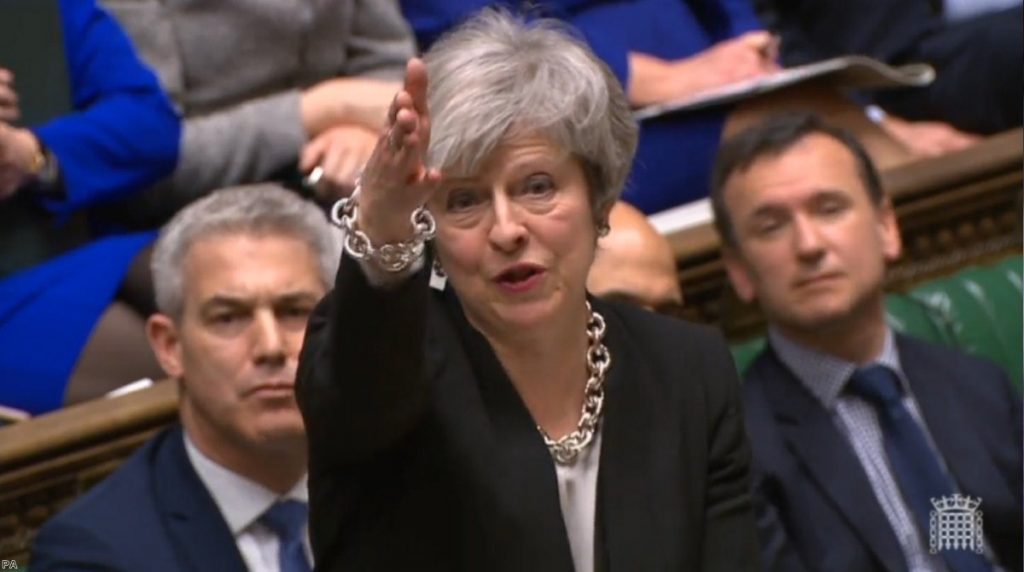It was the only Brexit majority the Commons had to offer. MPs voted, firmly and confidently, against reality. And then, just as firmly and confidently, they voted for fairy stories.
Sensible propositions had been put before them to give them power over the Brexit process. They rejected them one after another. Dominic Grieve wanted to give MPs six days to explore options and direct the government. They voted to deny themselves this power by 301 to 321. Yvette Cooper wanted to give them the power to extend Article 50 if it looked like Britain was about to crash out the EU without a deal. They voted to deny themselves this power by 298 to 321.
The one and only glimmer of hope was an amendment from Caroline Spelman which said MPs rejected leaving the EU without a deal, but contained no actual mechanisms to enforce it. This MPs accepted by 318 to 310. So they were insisting that no-deal should be ruled out but refusing to take any role whatsoever in preventing it themselves. They were like babies in suits.
It was as pitiful an exhibition as we've ever seen from them: a masterclass in cowardice. Even now, years after the result, they are petrified of being seen to somehow undermine Brexit. Their mania is so severe that they are prepared to sabotage the mechanisms which would achieve what they themselves say should take place.


That was how they rejected reality. Then they threw their lot in with the fairy tales.
The last vote was on Graham Brady's amendment to replace the backstop with "alternative arrangements". What were these alternative arrangements? No-one would say. Brady himself has no idea. The prime minister won't offer anything. Even the Brexit secretary dodged the question.
The backstop is only supposed to kick in if alternative arrangements, like the hardline Brexiters' dreams about frictionless technology, do not come to fruition. So applying them now was like answering a question with the question. What's your alternative arrangement if the alternative arrangements don't work? Well, an alternative arrangement of course.
The basic truth remained the same as it was before. The DUP and ERG will only be happy if the backstop is made time-limited or can be ended unilaterally by the UK. The EU will never accept it if those things hold. So no deal seems possible.
But all of that is irrelevant anyway, because the EU refuses to reopen the withdrawal agreement. Within minutes of the vote, it fired back its return salvo, from European Council president Donald Tusk. "The withdrawal agreement is and remains the best and only way to ensure the orderly withdrawal of the UK from the European Union," it said. "The backstop is part of the withdrawal agreement, and the withdrawal agreement is not open for re-negotiation."
May had promised something she could not specify and which had already been ruled out. And not only that: she had shot her own deal in the heart. It was No.10 which said the border in Ireland had to be kept open. It was No.10 which asked for it to cover the whole of the UK. Now, after all that negotiation, she is going to go back to the EU and demand that they destroy the accomplishments she herself secured.
It is insane. It is a degree of contortion which would be remarkable if it weren't so ghastly.
But in a way, it was typical May tactics. She prioritised vague promises over content. She sabotaged something – anything – in order to fight another day. She made promises she could not keep on issues she knew to be false. Once again, she said anything, anything at all, to survive just a little longer.
But there are consequences to this lunacy. Britain is now, it is clear to the world, not a serious country. The way it is behaving is simply not rational. Any reputation it had for credibility or sound judgement is gone. It is a basketcase.
That is humiliating enough. But it has significant medium-term implications too. Firstly, it shows why the backstop was needed in the first place. This country has become an unreliable negotiating partner. It will demand something one day then seek to detonate it the next. The events in the Commons today actually had the ironic effect of reaffirming to the EU the need for the backstop insurance policy.
On a broader level, we are about to go around the world asking for trade deals. But we're seen, by everyone, on the largest stage imaginable, to be fundamentally politically insane. We've gone mad and everyone is looking.
This is as bleak a day as we have had in the entire Brexit process. All roads now seem blocked. MPs won't back an extension to Article 50. They won't back May's deal. And they won't back no-deal. They've opted for fairy tales over action. Things are looking very bad indeed.
Ian Dunt is editor of Politics.co.uk and the author of Brexit: What The Hell Happens Now?
The opinions in politics.co.uk's Comment and Analysis section are those of the author and are no reflection of the views of the website or its owners.









